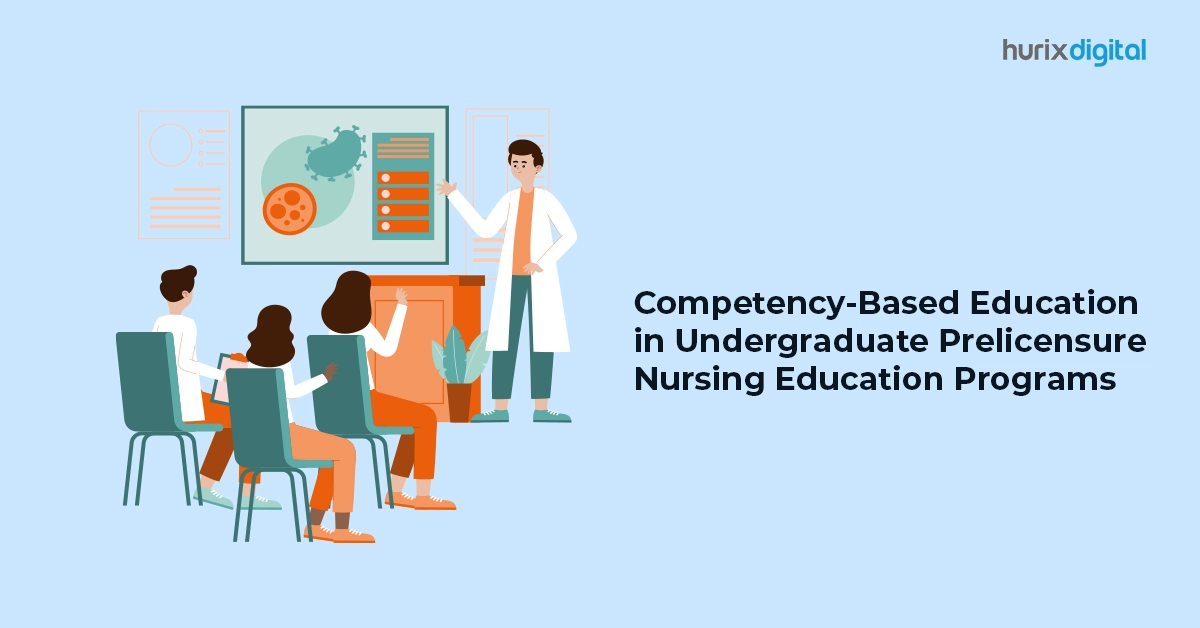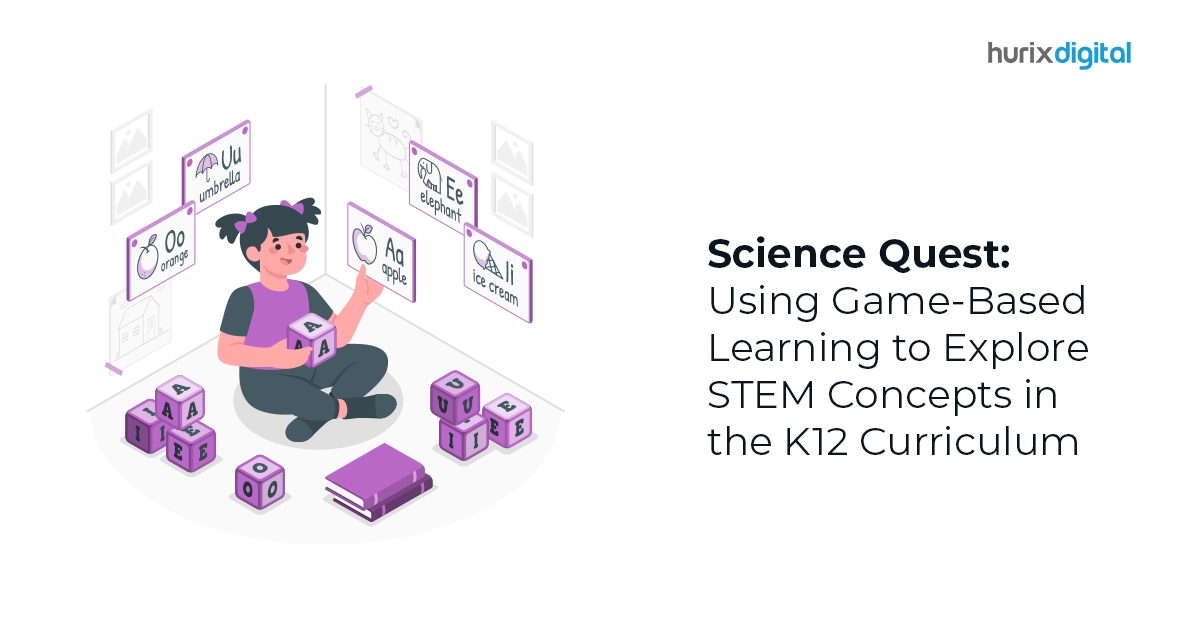
Competency-Based Education in Undergraduate Prelicensure Nursing Education Programs
Summary
Learn about the role of competency-based education in prelicensure nursing programs. This blog discusses how competency-based approaches are shaping nursing education.
The pandemic caused several societal and medical disruptions, which led to an acute shortage in the nursing workforce. Further, there was ongoing concern about upgrading and replenishing nursing education programs specifically for candidates facing financial constraints.
Competency-based education (CBE) in undergraduate prelicensure nursing education programs was introduced to address these challenges. CBE in nursing offers a flexible learning approach that empowers students to expedite their education and manage costs more effectively. It encompasses innovative approaches in prelicensure nursing education and addresses key concerns such as rising tuition fees, prolonged time to graduation, and maintaining program quality.
CBE is a promising solution that can streamline nursing education. CBE programs vary across institutions, and program quality is measured primarily by NCLEX pass rates. These measures can help candidates better understand the potential of CBE in addressing the existing challenges.
Table of Contents:
- Highlights of CBE in Undergraduate Prelicensure Nursing Education Programs
- Overview of the Undergraduate Prelicensure Nursing Education Programs
- About the Nursing Curriculum
- About Nursing Skills Assessment
- Nursing Process Overview
- Nursing Licensure Exam Preparation – Standards and Criteria
- Nursing Licensure Exam Preparation
- Revamping Nursing Curriculum Development for Modern Healthcare Trends
- Conclusion
Highlights of CBE in Undergraduate Prelicensure Nursing Education Programs
- There are more than 200 competency-based programs available across the United States.
- These programs are offered in various formats – traditional, hybrid, and radical approaches.
- CBE allows students to meet competencies by learning at their own pace, gaining credit for prior experience, and retaking assessments.
- CBE nursing programs meet accreditation standards like the NCLEX-RN, baccalaureate essentials, and QSEN.
- CBE nursing students exhibit higher academic performance and better mastery of core competencies, while educational institutions and faculty are experiencing evolving academic roles and accreditation requirements.
Also Read: Customized Assessments to Help Evaluate Competencies and Progress in Healthcare Education
Overview of the Undergraduate Prelicensure Nursing Education Programs
CBE in Undergraduate Prelicensure Nursing Education Programs is for students with varying educational backgrounds. It is a five-semester program that includes classroom instruction, laboratory work, and clinical experiences guided by experienced faculty.
Applicants must face a competitive selection process separate from general university admission. Completing a pre-licensure BSN degree helps students become registered nurses. This degree provides the essential skills and knowledge required to pass the NCLEX-RN exam and excel in the nursing profession.
About the Nursing Curriculum
Transitioning from the existing nursing curriculum to a CBE model may appear difficult. This transition requires the involvement of faculty members with diverse expertise. Modern institutions offer sample templates for curriculum mapping and resources for activities and assessments.
Nursing education has evolved to meet the demands of healthcare reform. The program curriculum emphasizes:
- Primary care settings -This requires nurses to possess effective primary care skills and collaborate within interprofessional teams.
- Students can expect to work closely with nurse preceptors in clinical settings. They must focus on providing care for various medical conditions.
- The program incorporates primary care modules to reinforce foundational nursing knowledge and prepare students for real-world scenarios.
- Collaborative practice, multimedia-rich interactive content, and simulation play vital roles in nursing education. Such practices address challenges and provide diverse learning opportunities for students across different care settings.
About Nursing Skills Assessment
In CBE, more consistent assessments and a structured curriculum are needed to alleviate faculty burdens. Nurse educators must balance the broader professional role of education with the preparation for licensure exams, a challenge also posed by CBE.
It presents an innovative approach to nursing education, enhancing clinical judgment and facilitating integration with Interprofessional Education IPE.
In nursing skills assessment, four types are recognized:
- Initial: The initial assessment occurs shortly after admission, involving gathering primary and secondary information and interpreting and validating data to establish patient needs and health problems. This forms a basis for ongoing focused assessments and future comparisons.
- Focused: Focused assessments target specific problems and can occur during the initial assessment or as part of ongoing data collection.
- Emergency: Emergency assessments aim to identify life-threatening issues during crises.
- Time-lapsed assessments: Time-lapsed assessments involve reassessing a patient’s health status against baseline data, which is crucial for long-term care planning.
Assessment prioritization and data collection structuring are vital for effective nursing practice. Following a comprehensive nursing assessment, health problems guide future nurse-patient interactions and assessment priorities.
Nursing Process Overview
Here is a 6-step program that completes the Nursing Process Education:
- Assessment: Gather comprehensive data including subjective and objective information, family, surgical, medical, and medication history, as well as psychosocial aspects.
- Analysis or Diagnosis: Candidates should formulate nursing diagnoses relying on clinical judgment to identify patient issues.
- Planning: Develop a care plan with goals, outcomes, and interventions customized according to the patient’s needs.
- Implementation: Execute interventions as per the care plan.
- Evaluation: Assess the success of interventions and adjust care plans accordingly.
- Documentation: Ensure culturally competent and linguistically appropriate care and evaluate patient response to treatment. Consider community support and conduct regular assessments after admission.
Nursing Licensure Exam Preparation – Standards and Criteria
The accreditation standards follow ACEN Standards for educational quality. Candidates need to prepare for NCLEX-RN with a Pre-Licensure Nursing Degree. Here, they will acquire the comprehensive knowledge necessary to excel in the NCLEX-RN licensing exam and work on a career opportunity as a nurse generalist.
This Nursing licensure exam preparation demands critical thinking skills and a firm grasp of ethical nursing principles. The curriculum aligns with the NCLEX-RN test plan, covering essential topics such as health assessment, adult health, mental health, pediatrics, obstetrics, pharmacology, informatics, research, ethics, and policy.
Furthermore, aspirants gain insight into caring for individuals across the lifespan, from newborns to elderly clients.
1. Hands-on Learning through Nursing Simulation
Immersive simulation experiences that offer meticulously designed clinical scenarios that foster student growth. Sun simulations feature a control room, nurses’ station, hospital rooms, and debriefing spaces.
Upon enrollment in the pre-licensure program, you’ll access these simulation suites during your third and fourth years of study. Students develop clinical skills and critical thinking in a risk-free environment, that prepares them according to real-world healthcare settings.
2. Career Opportunities after Graduation
Upon graduation, Prelicensure Nursing degree holders are eligible to sit for the NCLEX-RN exam. It paves the way for them to become registered nurse RNs.
A BSN offers RNs advanced training and leadership prospects, and this degree helps them further a master’s degree in nursing.
If you want to make a difference through nursing, you must explore the benefits of Competency-Based Education in Undergraduate pre-licensure nursing Education Programs today.
Nursing Licensure Exam Preparation
If you’re considering nursing school, you may need to sit for a nursing school entrance exam. Here is an overview of common nursing entrance exams:
1. National League for Nursing Pre-Admission Exam (PAX)
This exam assesses verbal and non-verbal skills along with comprehension of scientific concepts. It consists of 160 multiple-choice questions, and students are given two hours and five minutes to complete the exam.
2. Nursing Entrance Test (NET)
This test comprises six sections, and the test duration is 155 minutes. It focuses on high school-level math concepts and general academic skills.
3. Kaplan Nursing School Admission Test
This test of 180 minutes evaluates various skills and consists of four sections with 91 multiple-choice questions.
4. Test of Essential Academic Skills Exam (TEAS)
This test covers 170 questions on Reading, Math, English, and Science, and the test duration is 209 minutes.
5. Health Education Systems, Inc. Admissions Assessment (HESI A2)
It consists of 9 sections and focuses on high school-level knowledge, especially in science subjects.
6. PSB Aptitude for Practical Nursing Exam
This exam is intended for candidates pursuing practical and vocational nursing programs. Tests academic aptitude in various subjects. The exam duration is 105 minutes.
7. PSB Registered Nursing School Aptitude Exam
This test is designed for aspiring RNs. It consists of five sections, including academic aptitude, spelling, reading comprehension, natural sciences, and vocational adjustment. The test duration is 105 minutes.
8. PSB Health Occupations Aptitude Exam (PBS HOAE)
This exam is used to assess students entering healthcare training programs, including nursing. The duration of this exam varies, and it evaluates verbal, non-verbal, and academic aptitude.
Preparing for these exams means studying high school-level topics and using study guides and practice tests.
Revamping Nursing Curriculum Development for Modern Healthcare Trends
The nursing curriculum is rapidly evolving according to the latest advancements in the medical and healthcare industries. It aims to enhance students’ skills and readiness according to recent industry demands.
The focus is on refining the curriculum’s readability and relevance to real-time standards. Thus, the Refined Curriculum with Internet Information Analysis RC-IIA method has been introduced. Here are its core features:
- The RC-IIA method integrates distributed internet resources, scholarly journals, and existing curriculum data into an active nursing syllabus, eliminating redundancies and ensuring the inclusion of pertinent information.
- Additionally, it employs classification learning to enhance knowledge-based representations.
- It leverages refined information and a recommendation-based curriculum customized according to different standards. This approach ensures the use of existing and distributed information for comprehensive curriculum coverage.
- The revamped curriculum is designed to meet the end-of-program student learning outcomes across various nursing program types.
- It addresses role-specific nursing competencies for undergraduate programs. Furthermore, it adheres to safe practice standards in contemporary healthcare environments.
Significance of the Undergraduate Prelicensure Nursing Education Curriculum Development
- Alignment with Contemporary Professional Standards
- Progressive Learning Outcomes
- Faculty Development and Curriculum Review
- Comprehensive Program of Study
- Integration of Contemporary Concepts
Also Read: Healthcare Data Security: Ensuring Privacy and Compliance in App Development
Conclusion
The nursing education system focuses on quality, cost-effectiveness, and timely completion. Competency-based education is an innovative approach related to undergraduate nursing programs that streamlines program durations and maintains educational rigor. The emphasis of nursing education remains on preparing competent, skilled professionals equipped to meet the challenges of modern healthcare.
At Hurix Digital, you can learn everything about CBE in undergraduate pre-licensure nursing education programs. Our comprehensive solutions and expert team help aspirants advance their careers in nursing and positively impact the healthcare industry.
Contact us today!

Senior Vice President
A Business Development professional with >20 years of experience with strong capability to sell new solutions and develop new markets from scratch. New Market Entry Specialist with experience of working in two of the largest emerging markets – China & India. Also covered other key markets in APAC, US, EU & ME. Exceptional experience of conceptualizing, ideating and selling new learning technologies like VR AR, etc. across multiple industry verticals.







